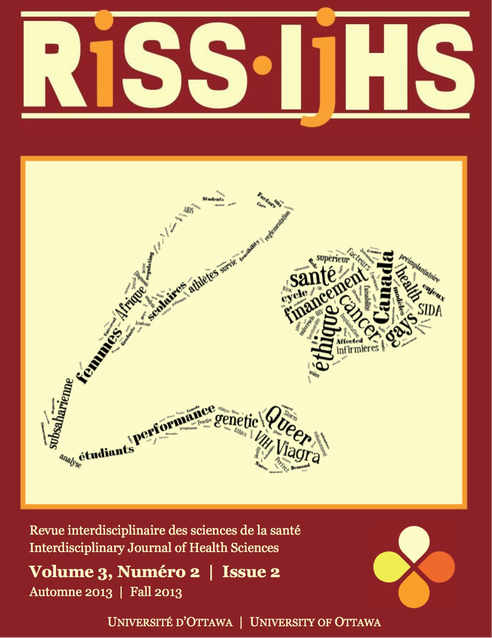Queers in the Classroom: The Role of Sexual Identity in the Academic Experiences of Gay Male Graduate Students
DOI:
https://doi.org/10.18192/riss-ijhs.v3i2.1341Keywords:
Gay males, sexual identity, graduate school, graduate students, academic experienceAbstract
The experiences of three self-identified gay male graduate students were explored to understand the role that sexual orientation played within their academic lives. Through semi-structured interviews, the participants were able to share their experiences of being a gay male graduate students and the effects on their educational experience. The transcribed interviews were analyzed using a modified grounded theory approach. Three main themes emerged: a) choosing to disclose sexual identity within the academic setting; b) challenges encountered when interacting with classmates; and c) benefits of being a gay male graduate student. Findings suggest that managing and expressing one’s sexual identity are important processes that interact with several aspects of the life of gay male graduate students.
References
Charmaz, K. (2006). Coding in grounded theory practice. In K. Charmaz, Constructing Grounded Theory: A Practical Guide Through Qualitative Analysis (pp. 42-71). Thousand Oaks, CA: Sage.
Chur-Hansen, A. (2004). Experience of being gay, lesbian or bisexual at an Australian medical school: A qualitative study. International Journal of Inclusive Education, 8 (3), 281-291. http://dx.doi.org/10.1080/1360311032000160607
Cotten-Huston, A.L., & Waite, B.M. (2000). Antihomosexual attitudes in college students: Predictors and classroom involvement. Journal of Homosexuality, 38 (3), 117-133. http://dx.doi.org/10.1300/J082v38n03_07
Crouch, M. & McKenzie, H. (2006). The logic of small samples in interview-based qualitative research. Social Science Information, 45, 483-499. http://dx.doi.org/10.1177/0539018406069584
D’Augelli, A.R. (1992). Lesbian and gay male undergraduates’ experiences of harassment and fear on campus. Journal of Interpersonal Violence, 7 (3), 383-395. http://dx.doi.org/10.1177/088626092007003007
Herek, G. (1993). Documenting prejudice against lesbians and gay men on campus. Journal of Homosexuality, 25 (4), 15-30. http://dx.doi.org/10.1300/J082v25n04_02
Jewell, L.M., & Morrison, M.A. (2010). “But there’s a million jokes about everybody...”: Prevalence of, and reasons for, directing negative behaviours toward gay men on a Canadian university campus. Journal of Interpersonal Violence, 25 (11), 2094-2112. http://dx.doi.org/10.1177/0886260509354499
Korfhage, B.A. (2006). Psychology graduate students’ attitudes toward lesbians and gay men. Journal of Homosexuality, 51 (4), 145-159. http://dx.doi.org/10.1300/J082v51n04_08
Lambert, E.G., Ventura, L.A., Hall, D.E., & Cluse-Tolar, T. (2006). College students’ views on gay and lesbian issues: Does education make a difference? Journal of Homosexuality, 50 (4), 1-30. http://dx.doi.org/10.1300/J082v50n04_01
Longerbeam, S.D., Inkelas, K.K., Johnson, D.R., & Lee, Z.S. (2007). Lesbian, gay, and bisexual college student experiences: An exploratory study. Journal of College Student Development, 48 (2), 215-230. http://dx.doi.org/10.1353/csd.2007.0017
Lopez, G., & Chism, N. (1993). Classroom concerns of gay and lesbian students: The invisible minority. College Teaching, 41 (3), 97-103. http://dx.doi.org/10.1080/87567555.1993.9926788
MacDougall, C., & Fudge, E. (2001). Planning and recruiting the sample for focus groups and in-depth interviews. Qualitative Health Research, 11, 117-126. http://dx.doi.org/10.1177/104973201129118975
Marshall, C., & Rossman, G. B. (2011). Managing, analyzing, and interpreting data. In C. Marshall & G. B. Rossman, Designing Qualitative Research (5th Edition) (pp. 205- 227). Thousand Oaks, CA: Sage.
Maxwell, J. A. (1998). Designing a qualitative study. In L. Bickman & D. J. Rog (Eds.), Handbook of Applied Social Research Methods (pp.69-100). Thousand Oaks, CA: Sage.
Newman, B. S., Dannenfelser, P. L., & Benishek, L. (2002). Assessing beginning social work and counselling students’ acceptance of lesbians and gay men. Journal of Social Work Education, 38 (2), 273-288.
Rainey, S., & Trusty, J. (2007). Attitudes of Master’s level- counselling students toward gay men and lesbians. Counselling and Values, 52, 12-24. http://dx.doi.org/10.1002/j.2161-007X.2007.tb00084.x
Rankin, S. A. (2005). Campus climates for sexual minorities. New Directions for Student Services, 111, 17-23. http://dx.doi.org/10.1002/ss.170
Rubin, H. J., & Rubin, I. S. (1995). Assembling the parts: Structuring a qualitative Interview. In Qualitative Interviewing: The Art of Hearing Data (pp. 145-167). Thousand Oaks, CA: Sage.
Stevens Jr., R. A. (2004). Understanding gay identity development within the college environment. Journal of College Student Development, 45 (2), 185-206. http://dx.doi.org/10.1353/csd.2004.0028
Stotzer, R. L. (2009). Straight allies: Supportive attitudes toward lesbians, gay men, and bisexuals in a college sample. Sex Roles, 60, 67-80. http://dx.doi.org/10.1007/s11199-008-9508-1
Strauss, A., & Corbin, J. (1998). Basics of qualitative research: Grounded theory: Techniques and procedures for developing grounded theory (2nd ed.). Thousand Oaks, CA: Sage.
Swank, E., & Raiz, S. (2010). Attitudes toward gays and lesbians among undergraduate social work students. Journal of Women and Social Work, 25 (1), 19-29. http://dx.doi.org/10.1177/0886109909356058
van Heugten, K. (2004). Managing insider research: Learning from experience. Qualitative Social Work, 3 (2), 203- 219. http://dx.doi.org/10.1177/1473325004043386
Downloads
Published
Issue
Section
License
- All authors published in the IJHS will retain copyright of their article.
- Authors grant the IJHS the right of first publication of their submitted articles.
- All articles published in the IJHS are licensed under a Creative Commons Attribution License that allows others to share articles if original authors and journal of initial publication are acknowledged.
- The IJHS is published online and in print, therefore the journal is not responsible for any unauthorized misuse of published content in either electronic or print form
- The IJHS retains the serial distribution rights to all contents
- It is the responsibility of the authors and not the IJHS to ensure proper permissions for all cited work have been obtained


